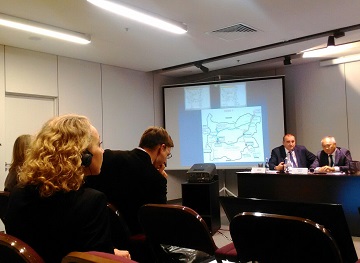
On October 5th, the Eurasian Unified Gas Supply System from Beijing to Paris round table took place as part of the St. Petersburg International Gas Forum. One of the topics of the discussion was the production and storage of biogas.
In a number of European states, the government encourages and promotes the production and use of biogas. For instance, France has been following this route and is planning to reach 30% benchmark of alternative energy usage by the year 2030. Denmark has developed a program for independent future energy. Germany has a host of gas production plants with their number amounting to several hundreds.
Biogas is produced by the breakdown of organic matter, such as refuse, agricultural waste, manure, slaughterhouse waste. Biogas consists of 55-65% of methane, 35-45% of carbon dioxide and about 1% of hydrogen and hydrogen sulfide. Maria Khaidina, senior lecturer at the department of Gas and Gas Condensate Fields Development and Operation at Gubkin Russian State University of Oil and Gas, says that depending on the material alternative fuel was produced of, its sulfur content can vary by a factor of several times. That is why biogas must go through a costly cleaning process. Otherwise, after we feed the fuel into the gas distribution network, equipment might fail due to high sulfur and CO2 contents.
"The trouble is that biogas producers in Europe fail to consider that aspect. The biofuel quality control issue remains unresolved. It is clear that Europe is seeking to break away from the dependency on Russian gas, but this approach compromises gas storage system integrity", says Maria Khaidina. According to her, seeking to bring down production costs by feeding biogas into gas dispensing systems will result in problems at the consuming end.
As stated by the Deputy Head of Engineering and Manufacturing Office of the Underground Gas Storage of the Department of Gas Transportation, Underground Storage and Use of Gazprom, Nikita Barsuk, to date, biogas production and use face several challenges. Most importantly, there has been little experience of working with gas after it is fed into the gas distribution network. There is no regulatory framework on biofuel production and storage. With the substances constituting biofuel, we are facing a problem of stockpiling pesticides. "There is no established practice of biogas use in the world, there is no experience and alternative solutions, which we are presently starting to see. I think it will take dozens of years before biogas starts to be a realistic alternative to conventional fuels, including natural gas", summed up Nikita Barsuk.